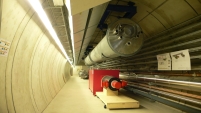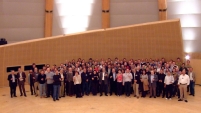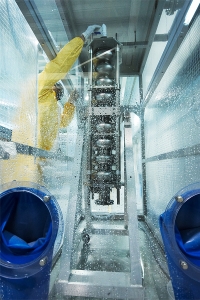A tunnel for (module) dummies
The XFEL mock-up tunnel helps scientists practice for the real thing

Almost like the real thing: the mock-up tunnel for the European XFEL. By the way, the klystron and transformer are made of wood. Photo: DESY |
It feels like the real accelerator tunnel, but itís only building 71 at DESY in Hamburg. Itís basically a tube made of concrete, 51 metres long and 5.20 metres in diameter. One accelerator module hangs from the top of the tube, water pipes, cable trays and ventilation ducts are installed and other accelerator parts stand around on the tunnel floor. All these are dummies, some even made of wood, but they are life-size dummies in building 71: the European XFEL mock-up tunnel.
Read more...
-- Jan Dreyling-Eschweiler, DESY |
|
 |
 |
|
|
 |
Linear collider collaborations meet
Project manager Marc Ross reports from CERN

Participants of CLIC08 meeting at CERN |
The ILC-CLIC (International Linear Collider - Compact Linear Collider Study) collaboration was started earlier this year at CERN. It consists of five working groups which are led by conveners from both projects. Collaboration mandates and activities were defined with an eye toward this autumnís workshops: the CLIC08 workshop, held at CERN from 14 to 17 October and the ILC-LCWS08, to be held in the middle of next month in Chicago. CLIC08 was the first time the group met face to face since the collaboration and its working groups were established. The collaboration is intended to serve two basic purposes: firstly to allow a more efficient use of resources, especially engineers, and secondly to promote communication between the two project teams. Of course, face-to-face meetings tend to be more effective than tele-conferencing, so many excellent opportunities for direct, informal, discussion arose between the two teams and we made good progress toward our second purpose. Since the framework of the meeting was the CLIC08 workshop, the agenda naturally focused on CLIC challenges and plans with specific collaboration highlights having a key, but minor overall role.
Read more...
-- Marc Ross |
 |
|
|
 |
From Interactions.org
30 October 2008
New Director-General for DESY
Professor Helmut Dosch will become the new Chair of the Directorate of the Research Centre DESY.(...) as member of the German Council of Science and Humanities, he evaluated the TESLA/XFEL project which later developed into the European X-ray laser project XFEL and the International Linear Collider ILC.
Read more... |
|
From Nature News
29 October 2008
How to repair the biggest science experiment in the world
...The key to preventing a similar disaster will be detecting faults in time, Rossi says. The enormous currents inside the LHC cannot simply be switched off, as it takes around a minute for heating coils and bypass circuits to dissipate the power contained inside the magnets...
Read more... |
|
From Ria Novosti
24 October 2008
Large Hadron Collider inaugurated
...The LHC will be used for colliding opposing beams of protons. Scientists are already discussing construction of a new-generation International Linear Collider (ILC) which will be far more powerful than the LHC.
Read more... |
|
|
 |
Progress in the SCRF technical area
Today's issue features a Director's Corner from Akira Yamamoto, Project Manager for the Global Design Effort.

Cross section of the S1-Global cryomodule assembly. |
As one of Project Managers for the ILC I was been given the current task of overseeing superconducting radiofrequency technology (SCRF) in August 2007, and it may be a good time to see how our SCRF technical area could make some progress with global cooperation.
Read more...
-- Akira Yamamoto
Director's Corner Archive |
 |
|
|
 |
Cavity in the shower

Preparation work is in progress at KEK for electro-polishing of cavity AES #001. AES #001 is a 9-cell cavity on loan to KEK from FNAL. This is the first instance of serious operation of the EP system at KEK STF. A performance validation of the electropolished cavity will be made at a vertical test stand. The photo shows the chemical polishing process on flanges of the cavity prior to electro-polishing. The crew is water-rinsing the inside of the 9-cell cavity, proceeding with chemical polishing the flanges on the other side. Photo: Nobu Toge, KEK
|
|
ILC Report
2008-015
Technology Benefits Deriving from the International Linear Collider
arXiv preprints
0810.4831
Determination of Wtb anomalous coupling at the ILC
0810.4381
Enhanced production of TeV right-handed neutrinos through the large magnetic moment
0810.4365
One-loop QCD and electroweak corrections to t-tbar Z0 production at an e+e- linear collider
|
|

